
Huldrych Zwingli or Ulrich Zwingli was a leader of the Reformation in Switzerland, born during a time of emerging Swiss patriotism and increasing criticism of the Swiss mercenary system. He attended the University of Vienna and the University of Basel, a scholarly center of Renaissance humanism. He continued his studies while he served as a pastor in Glarus and later in Einsiedeln, where he was influenced by the writings of Erasmus.

Johann Maier von Eck, often anglicized as John Eck, was a German Scholastic theologian, Catholic prelate, and early counterreformer who was among Martin Luther's most important interlocutors and theological opponents.

Martin Bucer was a German Protestant reformer in the Reformed tradition based in Strasbourg who influenced Lutheran, Calvinist, and Anglican doctrines and practices. Bucer was originally a member of the Dominican Order, but after meeting and being influenced by Martin Luther in 1518 he arranged for his monastic vows to be annulled. He then began to work for the Reformation, with the support of Franz von Sickingen.

Johannes Oecolampadius was a German Protestant reformer in the Reformed tradition from the Electoral Palatinate. He was the leader of the Protestant faction in the Baden Disputation of 1526, and he was one of the founders of Protestant theology, engaging in disputes with Erasmus, Zwingli, Luther and Martin Bucer. Calvin adopted his view on the eucharist dispute.

Wolfgang Fabricius Capito was a German Protestant reformer in the Reformed tradition.
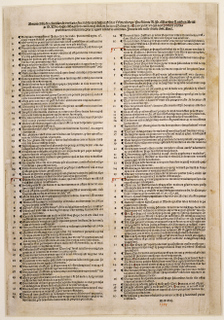
The Ninety-five Theses or Disputation on the Power and Efficacy of Indulgences is a list of propositions for an academic disputation written in 1517 by Martin Luther, professor of moral theology at the University of Wittenberg, Germany. They advance Luther's positions against what he saw as the abuse of the practice of clergy selling plenary indulgences, which were certificates believed to reduce the temporal punishment in purgatory for sins committed by the purchasers or their loved ones. In the Theses, Luther claimed that the repentance required by Christ in order for sins to be forgiven involves inner spiritual repentance rather than merely external sacramental confession. He argued that indulgences led Christians to avoid true repentance and sorrow for sin, believing that they could forgo it by purchasing an indulgence. These indulgences, according to Luther, discouraged Christians from giving to the poor and performing other acts of mercy, believing that indulgence certificates were more spiritually valuable. Though Luther claimed that his positions on indulgences accorded with those of the Pope, the Theses challenge a 14th-century papal bull stating that the pope could use the treasury of merit and the good deeds of past saints to forgive temporal punishment for sins. The Theses are framed as propositions to be argued in debate rather than necessarily representing Luther's opinions, but Luther later clarified his views in the Explanations of the Disputation Concerning the Value of Indulgences.

In the scholastic system of education of the Middle Ages, disputations offered a formalized method of debate designed to uncover and establish truths in theology and in sciences. Fixed rules governed the process: they demanded dependence on traditional written authorities and the thorough understanding of each argument on each side.

Sebastian Franck was a 16th-century German freethinker, humanist, and radical reformer.
Crypto-Calvinism is a pejorative term describing a segment of German members of the Lutheran Church accused of secretly subscribing to Calvinist doctrine of the Eucharist in the decades immediately after the death of Martin Luther in 1546.

In Protestant Christianity, the relationship between Law and Gospel—God's Law and the Gospel of Jesus Christ—is a major topic in Lutheran and Reformed theology. In these religious traditions, the distinction between the doctrines of Law, which demands obedience to God's ethical will, and Gospel, which promises the forgiveness of sins in light of the person and work of Jesus Christ, is critical. Ministers use it as a hermeneutical principle of biblical interpretation and as a guiding principle in homiletics and pastoral care. It involves the supersession of the Old Covenant by the New Covenant and Christian theology.

The history of the Calvinist–Arminian debate begins in early 17th century in the Netherlands with a Christian theological dispute between the followers of John Calvin and Jacobus Arminius, and continues today among some Protestants, particularly evangelicals. The debate centers around soteriology, or the study of salvation, and includes disputes about total depravity, predestination, and atonement. While the debate was given its Calvinist–Arminian form in the 17th century, issues central to the debate have been discussed in Christianity in some form since Augustine of Hippo's disputes with the Pelagians in the 5th century.

Paul Fagius was a Renaissance scholar of Biblical Hebrew and Protestant reformer.

The theology of the Cross or staurology is a term coined by the theologian Martin Luther to refer to theology that posits the cross as the only source of knowledge concerning who God is and how God saves. It is contrasted with the Theology of Glory, which places greater emphasis on human abilities and human reason.

Lutheranism as a religious movement originated in the early 16th century Holy Roman Empire as an attempt to reform the Roman Catholic Church. The movement originated with the call for a public debate regarding several issues within the Catholic Church by Martin Luther, then a professor of Bible at the young University of Wittenberg. Lutheranism soon became a wider religious and political movement within the Holy Roman Empire owing to support from key electors and the widespread adoption of the printing press. This movement soon spread throughout northern Europe and became the driving force behind the wider Protestant Reformation. Today, Lutheranism has spread from Europe to all six populated continents.
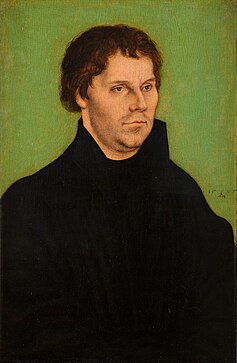
The theology of Martin Luther was instrumental in influencing the Protestant Reformation, specifically topics dealing with Justification by Faith, the relationship between the Law and the Gospel, and various other theological ideas. Although Luther never wrote a "systematic theology" or a "summa" in the style of St. Thomas Aquinas, many of his ideas were systematized in the Lutheran Confessions.
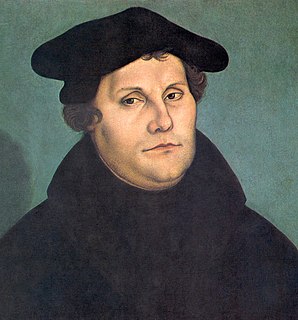
Martin Luther, was a German professor of theology, priest, author, composer, Augustinian monk, and a seminal figure in the Reformation. Luther was ordained to the priesthood in 1507. He came to reject several teachings and practices of the Roman Catholic Church; in particular, he disputed the view on indulgences. Luther proposed an academic discussion of the practice and efficacy of indulgences in his Ninety-five Theses of 1517. His refusal to renounce all of his writings at the demand of Pope Leo X in 1520 and the Holy Roman Emperor Charles V at the Diet of Worms in 1521 resulted in his excommunication by the pope and condemnation as an outlaw by the Holy Roman Emperor.

The Leipzig Debate was a theological disputation originally between Andreas Karlstadt, Martin Luther, and Johann Eck. Karlstadt, the dean of the Wittenberg theological faculty, felt that he had to defend Luther against Eck's critical commentary on the 95 theses and so challenged Johann Eck, a professor of theology at Ingolstadt university, to a public debate concerning the doctrines of free will and grace. The Leipzig Debate took place in June and July 1519 at Pleissenburg Castle in Leipzig, Germany. Its purpose was to discuss Martin Luther's teachings and was initiated and conducted in the presence of George, Duke of Saxony, an opponent of Luther. Eck, considered the master debater in Germany, was concerned about clerical abuses, but his life's work had been dedicated to the defence of Catholic teachings and combating heresy.
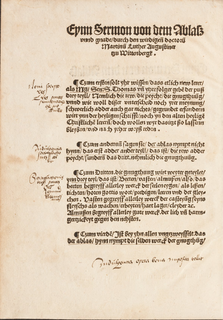
Martin Luther's Sermon on Indulgences and Grace is a pamphlet written in Wittenberg in the latter part of March, 1518 and published in April of that year.
The Two Kinds of Righteousness is a Lutheran paradigm. It attempts to define man's identity in relation to God and to the rest of creation. The Two Kinds of Righteousness is explicitly mentioned in Luther's 1518 sermon entitled Two Kinds of Righteousness, in Luther's Galatians Commentary (1535), in his Bondage of the Will, Melanchthon's Apology of the Augsburg Confession, and in the third article of the Formula of Concord. It is also the implicit presupposition governing Luther's Freedom of a Christian as well as other works.
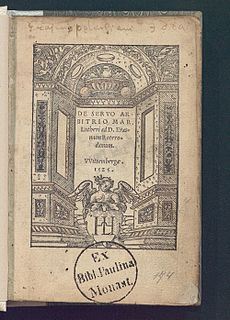
The Revealed God in Christian theology is a term coined by Martin Luther which affirms that the ultimate self-revelation of God is in his hiddenness. It is the particular focus of Luther’s work the Heidelberg Theses of 1518, presented during the Heidelberg disputation of 1518. In Christian theology, God is presented as revealed or ‘deus revelatus’ through the suffering of Jesus Christ on the cross. Debate of the term is found in the field of ‘Philosophy of Religion,’ where it is contested among philosophers such as J. L. Schellenberg. The term is usually distinguished from Luther’s concept of ‘The Hidden God’ or ‘deus absconditus’ which proposes that God actively hides. It is accepted that God is invisible, however Luther posed God as an actively hiding who can use this hiding to reveal himself. This distinction which permeates his theology has been the subject of wide interpretation, leading to controversy between theologians who believe the terms to be either antithetical or identical. These two conflicting strands of thought present the main problem when interpreting Luther’s doctrine of the Revealed God. In recent years the term has been used to inform modern analysis of religious themes such as evolution.




















